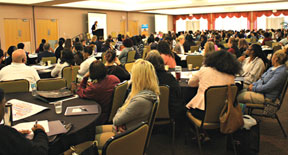
By Bob LaMendola
Florida Department of Health in Broward County
A growing coalition of advocates from schools, health care and community organizations is mobilizing to take more action to address a small but continuing rise in teen suicides.
The latest effort was a first annual Suicide Prevention Symposium for those who work with teens, to educate about the extent of the problem, causes and resources available to help at-risk teens.
About 300 people came to the all-day session, exceeding expectations.
“The response from the community was very positive,” says Dr. Paula Thaqi, Director of the Florida Department of Health in Broward County. “We’re trying to take action on a real problem facing families.”
The symposium was organized by DOH-Broward, Broward County Public Schools, the Children’s Services Council and others.
Last year, 10 Broward teens ages 14-17 committed suicide, up from two to five per year over the past decade.
In addition, a survey of about 1,500 high and middle school students in 2015 found that 3.5 percent (4.3 percent of girls) were injured attempting suicide, up from 2.2 percent in 2007.
About 14 percent of them (16.5 percent of girls) made a plan to commit suicide, highest since the 1990s. More than 30 percent (38 percent of girls) reported feelings of sadness and hopelessness for at least two weeks).
Reasons for the increased anxiety among teens range from family problems caused by the economic downturn, pressure to succeed, concerns over appearance, bullying and more.
Lesbian, gay and bisexual students, as well as Hispanic teen girls are at elevated risk for suicidal thoughts, says Charlene Grecsek, coordinator of the Network for Students with Emotional/Behavioral Disabilities at Broward public schools.
What to watch for? Warning signs include self-injury, withdrawal, loss of interest in friends and activities, change in eating, change in behavior, inability to enjoy life and decline in school grades, says Beth King, an assistant professor at Florida Atlantic University.
What to do? Encourage teens to talk about what bothers them. If they won’t talk to you, take them to talk to a friend, relative, teacher, counselor, faith leader or anyone they trust.
“Don’t ignore it,” King says. A resource is the Teen Hotline at Broward 2-1-1.
For more ore information contact; Maureen O’Keeffe at DOH-Broward, (954) 467-4700 — ext. 3014, or Maureen.OKeeffe@flhealth.gov.